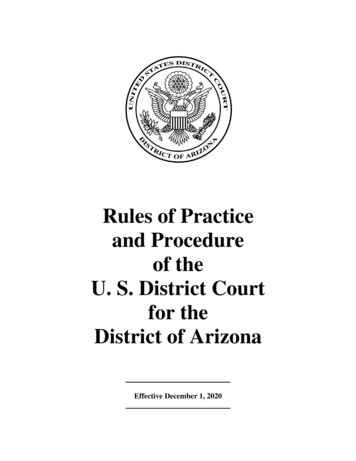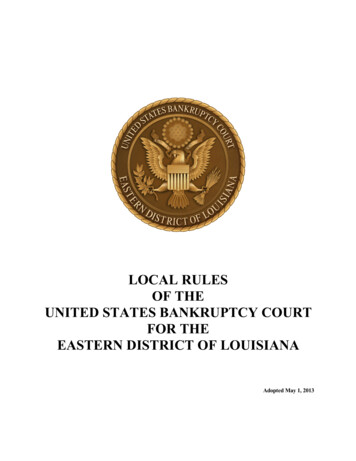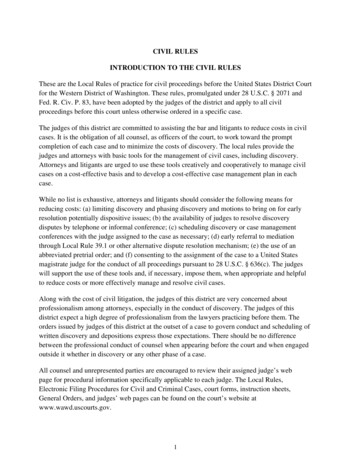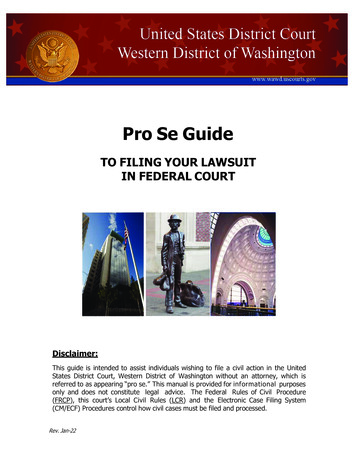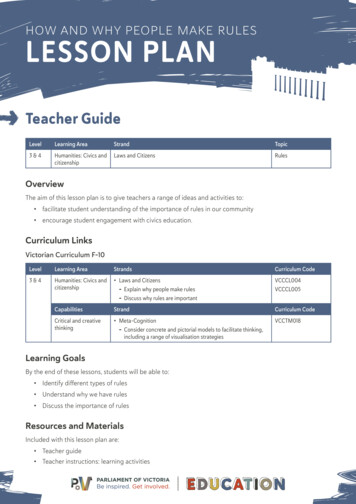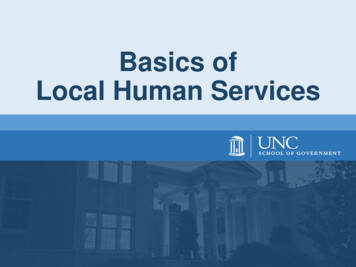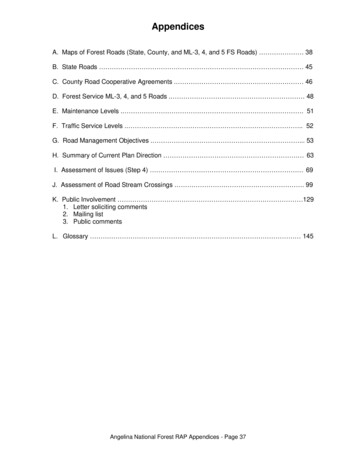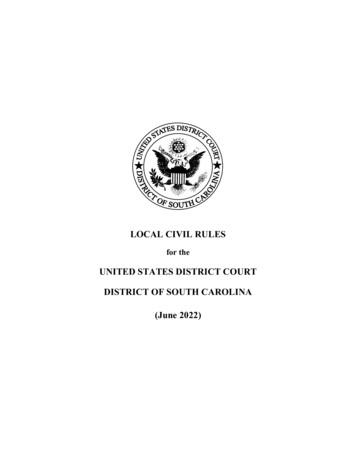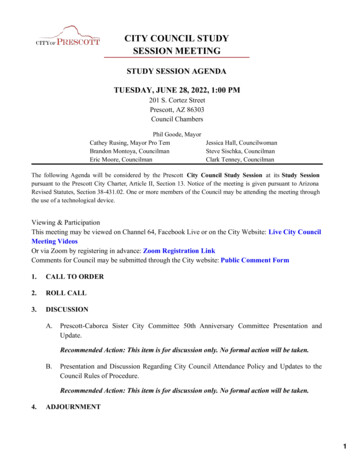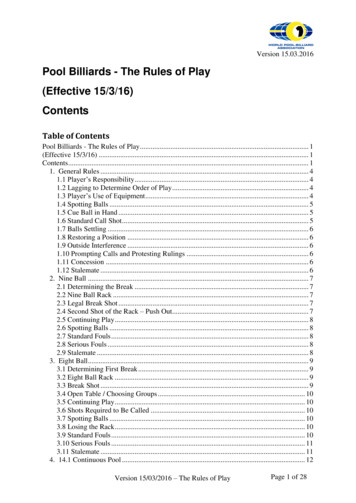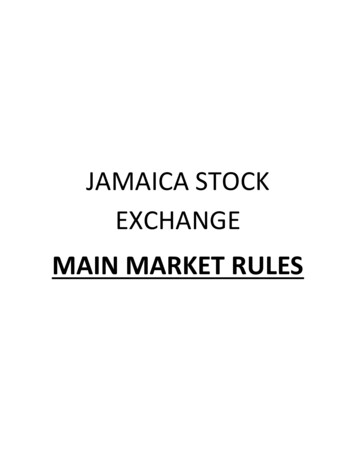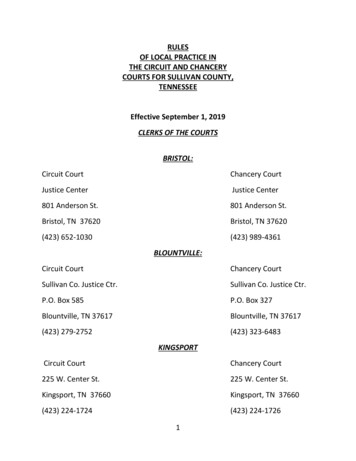
Transcription
RULESOF LOCAL PRACTICE INTHE CIRCUIT AND CHANCERYCOURTS FOR SULLIVAN COUNTY,TENNESSEEEffective September 1, 2019CLERKS OF THE COURTSBRISTOL:Circuit CourtChancery CourtJustice CenterJustice Center801 Anderson St.801 Anderson St.Bristol, TN 37620Bristol, TN 37620(423) 652-1030(423) 989-4361BLOUNTVILLE:Circuit CourtChancery CourtSullivan Co. Justice Ctr.Sullivan Co. Justice Ctr.P.O. Box 585P.O. Box 327Blountville, TN 37617Blountville, TN 37617(423) 279-2752(423) 323-6483KINGSPORTCircuit CourtChancery Court225 W. Center St.225 W. Center St.Kingsport, TN 37660Kingsport, TN 37660(423) 224-1724(423) 224-17261
TABLE OF CONTENTSPageRule 1Scope of Rules7Rule 2Assignment of Cases8Rule 3Motion Days9Rule 4Motions10Rule 5Temporary Restraining Orders11Rule 6Witness Subpoenas13Rule 7Expert Witnesses15Rule 8Jury and Non-Jury Trials16Rule 9Entry of Orders and Judgments18Rule 10Negotiations During Suit19Rule 11Removal of Records from Courthouse20Rule 12Filing of Motions for Summary Judgment,Motions to Dismiss and BriefsRule 13Mediation of Contractor/Homeowner, CommercialDevelopment, and Boundary Line DisputesRule 142224Conduct, Representation, Admission &Signing of Pleadings2514.01 Space within the Bar2514.02 Familiarity with Participants252
14.03 Approaching the Bench2514.04 Objections2514.05 Addressing Witnesses or Jurors2514.06 Notice of Appearance2614.07 Withdrawal of Counsel2614.08 Attire2614.09 Forbidden Conduct2714.10 Electronic Devices General Prohibition2714.11 Courtroom/Courthouse Security2814.12 Admission to Practice2814.13 Attorneys’ Fees2914.14 Signing of Pleadings and Proposed Orders2914.15 Filing With The Clerk2914.16 Adoptions, Surrenders and Conservatorships2914.17 Special Requirements for Adoption (related parents)3014.18 Filing of Discovery3014.19 Certificate of Service3014.20 Contacting the Judges/Chancellor31Rule 15General Sessions’ Appeals32Rule 16Parenting Plan/Parent Education Seminar/Mediation3316.01 General Provisions3316.02 Duties of Clerks and Attorneys333
16.03 Procedure for Determining Temporary Parenting Plan3516.04 Modification of Previous Permanent Parenting Plan3516.05 Parent Education Seminar3616.06 Permanent Parenting Plan3716.07 Mediation and Mediators3816.08 Mandatory Mediation3916.09 Waiver39Appendix A -Rule 17Waiver of Rights under Servicemembers’ Civil Relief Act40Affidavits for Contested Divorces and Support Actions42Appendix B Income, Expenses & Asset/Liability Statement43Appendix C Issues & Proposals49Rule 18Court Policy for Inclement Weather53Rule 19Fees for Fiduciaries and Attorneys5419.01. Fee forms5419.02. Sworn petition5419.03. Copy of sworn petition; notice5419.04. Reasonable compensation; factors5419.05. Petition; agreed fee554
19.06. Accounting5519.07. Minors and Incompetents5519.08. Petition: No time records required5519.09. Executors, Administrators, Trustees5619.10. Set fee prior to tax filings5619.11. Sworn petition5619.12. Accounting5719.13. Minors and Incompetents5719.14. Petition: No time records required5719.15. Setting fee prior to tax filings5719.16 No-fee statement57Appendix D Fee Statement of Fiduciary58Consent to Fiduciary Fee59Consent to Attorney Fee60Petition for Fiduciary Fee61Affidavit of Trustee, Conservator, AdministratorExecutor or Guardian62Statement of Activities and Time64Petition for Attorney’s Fee65Affidavit of AttorneyRule 20 Probate Forms66685
Rule 21Clerk and Master Proceedings69Rule 22Use of Depositions for Evidence at Trial70Rule 23Foreign Language Interpreters72Rule 24Accommodations for Persons with Disabilities736
RULE 1SCOPE OF RULESThe following Rules of Local Practice shall govern the rules of procedure inall of the Circuit and Chancery Courts of Sullivan County in civil actions and shallbecome effective September 1, 2019, expressly repealing all Local Rules adoptedpreviously.For purposes of these rules, the term pro se party (a/k/a “self-representedlitigant”) shall be used interchangeably with “attorney” and “counsel” when anindividual is representing himself/herself. Court personnel shall make a copy ofthese Local Rules available to pro se litigants.All days referred to in these rules shall be computed according to theTennessee Rule of Civil Procedure (T.R.C.P.) 6.01.Court personnel are forbidden from interpreting any rule of procedure orgiving any legal advice.Notice is hereby given to all persons that Court personnel assume noresponsibility for any misinformation regarding substantive law, procedural rules,rules of local practice, or local customs.E.G. -------------------E.G. Moody, Chancellor801 Anderson StreetBristol, TN 37620John S. McLellan, -----------------John S. McLellan, III, Circuit Court Judge225 West Center StreetKingsport, TN 37660William K. --------------------William K. Rogers, Circuit Court Judge200 Shelby StreetKingsport, TN 376607
RULE 2ASSIGNMENT OF CASESAll civil actions filed shall be assigned to the Circuit Judges and Chancellorpursuant to an order entered on July 24, 1984, as authorized by T.C.A. §16-2-509and as said order may hereinafter be amended.The order of assignment of cases requires the Clerks of the Court to assignthe cases as follows:(a) To the Judge of the Circuit Court Part I, two of every five cases filed inthe Circuit and Chancery Courts at Kingsport and Bristol and all civil cases filed inCircuit Court at Blountville.(b) To the Judge of the Circuit Court Part II, one of every five cases filedin the Circuit and Chancery Courts at Kingsport and Bristol, but no jury cases.(c)To the Chancellor of the Chancery Court, two of every five cases filedin the Circuit and Chancery Courts at Kingsport and Bristol and all cases filed inthe Chancery Court at Blountville.Petitions for approval of workers’ compensation settlements, workers’compensation medical benefits’ settlements, minors’ settlements, structuredsettlement buyouts, etc. shall not be heard unless the petition states that “THIS ISTHE FIRST APPLICATION FOR APPROVAL OF THE PROPOSED SETTLEMENT.”In order to preserve the integrity and control of the Court’s docket, attempts tocircumvent the Court’s random case assignment process are prohibited.8
RULE 3MOTION DAYSMotion Days are set aside for the purpose of expediting the trial of the nonjury docket.All matters which require more than thirty minutes shall not be set orheard on Motion Days. Matters that may be set on Motion Days by counsel,include but are not limited to: orders of protection; uncontested divorces;motions for temporary support; contempt actions; motions to enforce and/ormodify visitation rights; motions to enforce marital dissolution agreementsand/or parenting plans; motions for summary judgment, and motions to dismiss.Contested custody cases and contested divorce actions shall not be heardon Motion Days and counsel shall not cite persons to appear in suchproceedings on Motion Days. Application must be made to the Court to set thetrial of these cases.Motion Days for Circuit Court Part I shall be held at Kingsport on the firstand third Fridays of each month and Bristol on the second and fourth Fridays.Motion Days for Chancery Court shall be held at Kingsport on the second andfourth Fridays of each month and at Bristol on the first and third Fridays. MotionDays for Circuit Court Part II shall be held at Kingsport on the first Friday of eachmonth and at Bristol on the third Friday. Motion Days may also be scheduled forother days. Attorneys shall confirm Motion Days with the Clerks of the Courts.Cases pending in the Chancery Court at Blountville or the Circuit Court atBlountville may be heard on any Motion Day at Bristol or Kingsport.9
RULE 4MOTIONSA. All motions shall be set for hearing within a reasonable length of time afterfiling and prior to the commencement of the session of court when the caseis scheduled for final hearing.The attorney who files a motion has the responsibility to make atimely application to the Clerk to set the matter for a hearing. Failure tocomply with this rule shall be construed by the court as an abandonment ofthe motion.Motions for new trials, motions to amend a judgment, or any posttrial motion shall be presented to the court for hearing and argumentwithin 30 days after the motion is filed, but not prior to the discharge of thejury. In the event counsel fails to present the motion within a 30-day periodafter filing, the court may make a ruling without oral argument. Seegenerally Jerkins v.McKinney, 533 S.W. 2d 275 (Tenn. 1976).B. Notice of Hearings shall be on a separate sheet of paper and shall clearlystate all issues to be heard. Any issues not listed will not be heard.10
RULE 5TEMPORARY RESTRAINING ORDERSApplications for ex parte restraining orders must be presented to the Judgeor Chancellor of the Court in which the action is pending. If the Judge orChancellor is disqualified, disabled or absent from the county, the application maybe presented to a Judge or Chancellor of a Court having comparable jurisdiction.See T.R.C.P. 65.04(3). In domestic relations’ cases, application for an ex parterestraining order may be presented to a Judge or Chancellor sitting byinterchange in order to expedite the issuance of such orders.RELIEF VIA INJUNCTION OR RESTRAINING ORDER CONSTITUTES ALIMITATION UPON THE FREEDOM OF ACTION OF AN INDIVIDUAL AND SUCHRELIEF WILL NOT BE GRANTED LIGHTLY OR UNADVISEDLY. SUCH RELIEF IN AN EXPARTE APPLICATION WILL ONLY BE GRANTED WHERE IT IS CLEARLY SHOWNTHERE IS NECESSITY FOR QUICK ACTION. THE PARTY APPLYING FOR SUCH RELIEFMUST SUSTAIN THE BURDEN OF SHOWING ITS NECESSITY, AND THIS BURDEN ISINCREASED IN THE ABSENCE OF THE PARTY WHOSE FREEDOM OF ACTION ISSOUGHT TO BE RESTAINED EVEN THOUGH TEMPORARY.RESTRAINING ORDERS SHALL NOT BE WORDED IN SUCH A MANNER AS TODIRECT A CHANGE OF CUSTODY.The Temporary Restraining Order in a domestic relations’ case shall notapply to children over 18 who have graduated from high school unless they arementally or physically disabled.In other than domestic relations’ cases, temporary restraining orders willnot be signed ex parte without at least telephone or electronic notice to theopposing counsel or party of place and time the moving party will appear before aJudge or Chancellor.11
NOTE: No such extraordinary process shall be granted, unless the partyapplying for it states in the party’s petition “THIS IS THE FIRST APPLICATION FORSUCH PROCESS.” See T.C.A. § 29-1-107.12
RULE 6WITNESS SUBPOENASA witness, who is directed by subpoena to appear at a hearing or trial, isentitled to reasonable notice in advance of the hearing or the trial. Officersserving process are also entitled to reasonable notice in advance of the trial.Unless there is a statute or rule of law directing otherwise, subpoenas for awitness must be issued and delivered to the person authorized to serve thesubpoena at least three (3) full days prior to the date of the hearing or trial atwhich the witness is ordered to appear. Failure to serve a witness with asubpoena that has not been issued and delivered within at least three (3) full daysprior to the date of the hearing or trial shall not be a ground for a continuance ofthe hearing or trial.All subpoenas for witnesses shall be issued by the Clerk in accordance withRule 45 of the Tennessee Rules of Civil Procedure and T.C.A. §23-2-105.Counsel of record and pro se litigants shall be responsible for issuance ofsubpoenas in accordance with this rule and the Tennessee Rules of CivilProcedure as well as T.C.A. §23-2-105 and other applicable rules.Nothing in this Rule shall prohibit Counsel of record and pro se litigantsfrom entering into an Agreed Order that allows the release and distribution ofrelevant and material information between interested parties, provided suchAgreed Order does not conflict with the Tennessee Rules of Civil Procedure, aswell as any other State or Federal rules or statutes governing the release anddistribution of such information.SUBPOENAS FOR MEDICAL RECORDSAll subpoenas issued by the Clerk for medical records shall reflectcompliance with the Health Insurance Portability and Accountability Act(H.I.P.A.A.). See 45 C.F.R. §164.512(e).13
The Clerk shall not issue a subpoena pursuant to T.R.C.P. 45.02 formedical records unless the subpoena includes the following:HIPAA NOTICEA copy of this subpoena has been provided to counsel for the patient or thepatient by mail, electronic mail or facsimile on the day of , 20so as to allow him/her seven (7) days to:(A) serve the recipient of the subpoena by mail, electronic mail, or facsimilewith a written objection to the subpoena, with a copy of the notice by mail,electronic mail, or facsimile to the party that served the subpoena, and(B) simultaneously file and serve a motion for a protective order consistentwith the requirements of T.R.C.P. 26.03 and 26.07.If no objection is made within seven (7) days of the above date, you shallprocess this subpoena and produce the documents by the date and time specifiedin the subpoena. The signature of counsel or party on the subpoena iscertification that the above notice was provided to the patient.14
RULE 7EXPERT WITNESSESUnless counsel agree otherwise or the court orders otherwise, no expertwitness shall be permitted to testify in person at a hearing or trial or bydeposition unless the party offering the expert witness has provided opposingcounsel with an up-to-date written report of the expert witness at least five (5)days prior to the date of the deposition or the personal appearance of thewitness. The report shall contain at least the minimum information as required byT.R.C.P. Rule 26.02 (4)(A). This rule shall have no application where a depositionof an expert witness is taken by any party for discovery.When a defendant exercises his or her legal right to have a plaintiffindependently examined, counsel shall seek to agree to the independentexaminer. If an agreement cannot be reached, the defendant shall petition thecourt for an appropriate order requiring the plaintiff to submit to suchexamination by a physician designated by the Court. It shall be the duty of counselof the defendant to obtain a written report of the independent examiner as soonas possible following the examination and to deliver and/or mail a copy of saidwritten report to counsel for the plaintiff immediately upon the receipt of it.Unless special leave of the Court is obtained, each side shall be limited totwo (2) expert witnesses concerning the same issue. This limitation upon expertwitnesses is to prevent cumulative testimony. A party to a case who testifies asan expert witness shall not be considered as one of the two expert witnesses.15
RULE 8JURY AND NON-JURY TRIALSA. JURY TRIALS. Jury trials shall be set at regularly scheduled docketsoundings. The Circuit Court Clerk shall advise counsel of record of suchsoundings. All attorneys of record shall be responsible for answering every docketcall. Cases shall be set for trial from a list prepared in the order that the actionswere filed. No case shall be set for trial unless it is “at issue” under the rules ofpleading and practice. Cases shall not be set for trial solely for the purpose ofnegotiations.Plaintiff’s counsel shall be responsible for preparing an order setting thetrial date and shall serve a copy on all parties immediately following the docketsounding.Generally, there shall be no setting of cases outside a regular scheduleddocket sounding except: (1) where the action was set for trial and could not beheard because of a trial in progress; or (2) where out-of-state witnesses areexpected to travel a considerable distance to attend the trial; or (3) where otherextraordinary circumstances justify a pre-setting of the action.Consolidation of actions. In cases where third-party actions are pending,such cases shall not be consolidated for trial with the original action unlessexpress approval of the Court is granted prior to or at the sounding of the docket.Third-party actions which raise new issues and which appear to unduly complicatethe original issues, shall be severed for trial.Communications with jurors. After the jury venire has been released andwhile the term or session of Court is still in progress, an attorney or any otherperson shall not communicate with or cause another person to communicate withany juror regarding a trial. After the term of Court is concluded and the jury isdischarged, an attorney may talk to any juror, if such juror agrees to engage in aconversation, but shall refrain from asking questions or making comments16
calculated to harass or embarrass the juror or to influence his/her actions infuture jury service.Settlement. Counsel shall promptly notify the Clerk’s Office and the Judge’sOffice of a settlement. Failure to comply with this rule may result in the taxing ofthe costs of bringing the jury in against the parties and/or the attorneys of record.Subrogation matters. When a case is set for jury trial, it is set for trial for allpurposes, including all subrogation claims. If a settlement is agreed upon by all ofthe parties, leaving only a subrogation claim outstanding, the subrogation claimcan be continued if it is moved to the non-jury docket. Otherwise, the subrogationclaim shall be heard by the jury during the original trial.Chancery jury trials. In the event a party requests a jury in a Chancery case,it shall be the responsibility of the attorney for the party requesting the jury tocontact the Circuit Court Clerk and to add the Chancery case to the end of theCircuit Court Jury Docket.Continuances. The Clerk of the Court is not permitted to acceptannouncement of a continuance of a Non-Jury case. If the parties agree that aNon-Jury case should be continued, counsel shall advise the AdministrativeAssistant to the Judge or Chancellor to whom the case is assigned or the Judge orChancellor to whom the case is assigned. A continuance may only be granted bythe Judge or Chancellor to whom the case is assigned. The moving party shall beresponsible for preparing an Order, which has been approved by all counsel,continuing the trial date.B. NON-JURY TRIALS. Non-Jury cases shall be set for trial with theAdministrative Assistant to the Judge or Chancellor to whom the case is assigned.No case shall be set for trial unless it is “at issue” under the rules of pleadings andpractice. Plaintiff’s counsel shall be responsible for preparing an order setting thetrial date and shall serve a copy on all parties.C. CASES MAY BE SET FOR TRIAL. (a) without the request of the parties butupon notice to the parties, or (b) upon request of a party and notice to the otherparties pursuant to rule 40 TRCP.17
RULE 9ENTRY OF ORDERS AND JUDGMENTSIt shall be the duty of every counsel appearing before the Court to prepareand submit a judgment or order consistent with the relief orally granted. Suchorders and judgments shall be filed within fifteen (15) days after theannouncement of the decision by the Court, or after the verdict of the jury.Proposed orders or judgments may be lodged with the Clerk or directlywith the Court.If original orders are not filed, an electronic copy must be filed instead of afax copy.If it is necessary to file a fax copy due to time constraints, an electronic copyor the original order shall be substituted.Unless the parties agree to the contrary, the order or judgment shall beprepared by counsel for the successful party or if the decision or verdict be partlyin favor of each party, then the order or judgment shall be prepared by counselfor the plaintiff. If a dispute occurs in the wording, the party charged with itspreparation shall submit directly to the Judge’s or Chancellor’s chambers aproposed order or judgment with notice to opposing counsel. Opposing counselshall have five (5) working days thereafter to prepare an alternate judgment andsubmit it directly to the Judge’s or Chancellor’s chambers with like notice to theother counsel.When counsel submits an order or judgment pursuant to this rule, it MUSTbe accompanied by a statement that counsel has made a bona fide effort toresolve all disputes with opposing counsel before it will be considered. Opposingcounsel’s competing order or judgment must track the first one submitted so thatthe differences are readily ascertainable.The Court will dismiss, sua sponte, all cases which have not had any activitywithin 2 years.18
RULE 10NEGOTIATIONS DURING SUITWhen suit has been filed and process has been served upon the defendant,the plaintiff’s attorney shall only negotiate with the attorney for the defendant orwith any person designated by the defendant’s counsel as his agent fornegotiation. In the event the defendant is not represented by counsel, theplaintiff’s attorney will only negotiate settlement with the defendant personally.When defendant’s counsel designates a person to act as his agent tonegotiate, a letter confirming the same shall be sent to the plaintiff’s counsel witha copy of the letter to the Clerk of the Court for inclusion in the Court file.It shall be the duty of all Members of the Bar to determine, from the Clerkof the Court, whether the plaintiff or the defendant is represented by counsel ofrecord before negotiating during the pendency of any suit.Any person, not an attorney of record, who in any way interferes with theorderly procedures of the Courts by participating in any case, by contacting theadverse party for the purpose of negotiating a settlement or for any otherunauthorized purpose, will be in violation of this rule and may be held incontempt of court.19
RULE 11REMOVAL OF RECORDS FROM THE COURTHOUSEAll records in the custody of the office of the clerk, except records renderedconfidential by express provisions of law, are public records and shall be madeavailable under the following procedure and policy established by the CircuitCourt Clerk and the Clerk and Master.Court files can only be checked out by Judges, Chancellors, the ChildSupport Magistrate, or another court.If a citizen of the State of Tennessee requests to see a file, a minute book,or Laserfiche or have copies made, the following procedures shall be followed:(a.)A request to view a file can be made orally or in writing to the Clerkat no charge. A request for copies must be made in writing and paid for inadvance with cash, money order or a cashier’s check. The Clerk may chargefor their time if the work takes longer than five (5) hours.(b.)If possible, the file should be made available for inspection promptly.If not possible, within seven (7) business days, the Clerk may deny therequest in writing or complete a records’ request response form includingthe basis for the denial or furnish the requestor a completed records’request response form stating the time necessary to produce the recordincluding the copying fee.(c.)The Clerk may provide a list of the rule entries to the requestingparty. The documents that have been requested must be reviewed by theClerk. If any document contains confidential information, including but notlimited to, Social Security numbers, credit card account numbers, loanaccount numbers, addresses and telephone numbers of individuals thathave filed an Order of Protection and have requested that their informationbe confidential, the Clerk will make a copy, redact the information, andthen make a copy of the redacted copy. Confidential information containedin a sealed envelope can only be opened upon court order. If the requestor20
(other than the attorney of record or court personnel) requests a certifiedcopy, then the clerk must write on the certification that this is a copy of aredacted copy.(d.)Files removed from the courtroom by counsel shall be takendirectly to the Clerk’s office.21
RULE 12FILING OF MOTIONS FOR SUMMARY JUDGMENT,MOTIONS TO DISMISS, AND BRIEFSWhen briefs are requested or submitted without request, such submissionsshall be made directly to the Judge or Chancellor In chambers and counsel shallnotify opposing counsel of such submission by forwarding a copy to opposingcounsel.In all cases involving motions under Rule 12 or Rule 56, the following shallbe submitted directly to the Judge or Chancellor in chambers.First, the moving party shall submit, by twelve (12) noon at least ten(10) working days before the hearing on the motion, a package containingcopies of:(a.)Notice of time, date and place of motion;(b.)Motion to dismiss or for summary judgment;(c.)Relevant pleadings;(d.)In compliance with the manner and form of Rule 56.03 (T.R.C.P.), aseparate, concise statement of the material facts as to which the movingparty contends there is no genuine issue for trial supported with a specificcitation to the record (only the portions of the depositions relevant to themotion shall be submitted); and,(e.)Brief in support of the motion.Second, the party opposing the motion shall, at least six (6) workingdays before the hearing on the motion, submit a package containing copiesof:(a.)A response in accordance with T.R.C.P. 56.03 (only the portionsof the depositions relevant to themotion shall be submitted);and(b.)Supporting brief.22
Third, if the non-moving party has asserted additional facts, themoving party’s reply shall be submitted in the manner and form specified inT.R.C.P. 56, at least three (3) working days before the hearing on themotion.If the parties change the time, date, and/or place of the motion, the movingparty shall immediately notify the Judge’s or Chancellor’s office. Likewise, themoving party shall also notify the Judge’s or Chancellor’s office in writing of thetime, date and/or place at least five (5) working days before the new date for thehearing.23
RULE 13MEDIATION OF CONTRACTOR/HOMEOWNERDISPUTES AND COMMERCIAL DEVELOPMENTDISPUTES, AND BOUNDARY LINE DISPUTESIn a proceeding where a dispute exists between the parties as to the qualityor quantity of the work performed on new construction of a residential orcommercial structure or remodeling of a residential or commercial structure, thedispute shall be submitted to mediation before a trial will be scheduled.In a proceeding where a dispute exists between the parties as to theinterpretation of the terms of an agreement for work performed on newconstruction of a residential or commercial structure or remodeling of aresidential or commercial structure, the dispute shall be submitted to mediationbefore a trial will be scheduled.All boundary line disputes are required to go to mediation before trial.Should the parties reach an impasse as to the selection of a mediator tohear the dispute, counsel of record or pro se litigants shall immediately inform theCourt of the impasse and the Court will select and appoint a "Rule 31 AlternativeDispute Resolution Mediator" that is neutral to all of the parties.The costs of mediation shall initially be taxed equally to the parties as courtcosts unless otherwise agreed by the parties.24
RULE 14CONDUCT, REPRESENTATION, ADMISSIONAND SIGNING OF PLEADINGS14.01. Space within the Bar. The space within the bar of the courtroom isreserved for parties engaged in the case on trial, attorneys and court officials.Spectators and prospective jurors and witnesses shall be seated outside the bar inthe general seating area. The presence of infants in the courtroom is discouraged.14.02. Familiarity with Participants. During trial, attorneys shall not exhibitfamiliarity with witnesses, jurors, or opposing counsel. The use of first names foris not allowed. No juror shall be addressed individually by name during openingstatements or closing arguments. No attorney, party, witness, or other interestedperson shall engage in any conversation with any member of the jury panel duringthe trial without express consent of the Court.14.03. Approaching the Bench. Attorneys shall not approach the benchwithout Court approval. Counsel shall not lean on the bench or appear to engagethe Court in conversation in a confidential manner.14.04. Objections. Attorneys shall not interrupt the Court or opposingcounsel until the statement being made is fully completed, except whenabsolutely necessary to protect a client’s rights, and should respectfully await thecompletion of the statement or opinion. When objection is made to a questionasked, counsel should refrain from asking the witness another question until theCourt has had an opportunity to rule upon the objection. Objecting counsel shallstate the legal grounds of the objection without argument or discussion except byleave of Court.14.05. Addressing Witnesses or Jurors. Attorneys and pro se parties shallstand while examining witnesses or otherwise addressing the Court or jury.Exceptions may be made in the Court’s discretion. When attorneys or pro se25
parties are examining witnesses or addressing the jury, they shall not approachthe witness or jury without the Court’s permission.14.06. Notice of Appearance. Only an attorney who has entered anappearance in a case will be counsel of record. Entry of appearance shall be byfiling a pleading on behalf of a party, filing a formal notice of appearance, orwritten notice filed with the clerk.14.07. Withdrawal of Counsel. No attorney shall be allowed to withdrawexcept for good cause and by leave of Court upon motion after notice to all othercounsel and/or pro se parties, and to the client of the attorney wishing towithdraw. The motion shall set forth the reason for withdrawing with specificity,the status of the case, and whether withdrawal will result in a delay. All motionsto withdraw shall state the trial date or that no trial date has been set and shallcomply with the Code of Professional Responsibility.The order allowing withdrawal shall bear a certificate of service reflectingthat a copy of the order allowing withdrawal has been furnished both to theopposing attorney (or to the opposing party, if
Kingsport, TN 37660 Kingsport, TN 37660 (423) 224-1724 (423) 224-1726 . 2. TABLE OF CONTENTS . Page . 14.13 Attorneys' Fees 29 . 14.14 Signing of Pleadings and Proposed Orders 29 . Contested custody cases and contested divorce actions shall not be heard
